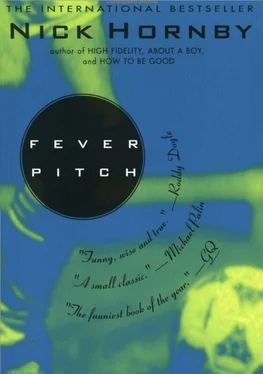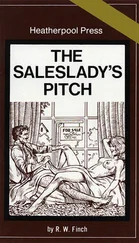I felt an arm around my shoulders and realised for the first time that I was standing next to three Leeds fans, an old man, his son, and his grandson. “Never mind, lad,” said the old man. “They’ll be back.” For a moment it felt as though he was holding me upright, until the first and most intense spasm of misery passed and I regained the strength in my legs. Almost immediately a couple of Arsenal suedeheads with an unmistakable and ominous fury in their eyes pushed their way through the crowd towards the four of us. I stepped back, and they removed the Leeds scarf that was around the little boy’s neck. “Give that back,” his dad said, but only because he knew it would be a weak father who said nothing, not in any expectation of success. There was a brief windmilling of fists and the two older men staggered backwards; I didn’t stay around to find out what kind of beating they took. I ran for the gangway and went straight home, frightened and sick. It was the only manner, really, in which the Centenary Cup Final could have ended.
ARSENAL v WOLVES
15.8.72
Over the summer of 1972, things changed. Arsenal, the most British (that is to say, the dourest and most aggressive) team you could imagine, went all continental on us, and for half a dozen games at the start of the 72/73 season decided to play Total Football. (This, for the benefit of those with only a sketchy grasp of football tactics, was a Dutch invention which necessitated flexibility from all the players on the pitch. Defenders were required to attack, attackers to play in mid-field; it was football’s version of post-modernism, and the intellectuals loved it.) That August at Highbury, gentle and appreciative applause was as familiar a sound as sixty thousand shuffling feet had been a couple of years earlier. Imagine Mrs Thatcher coming back from Brussels and lecturing us on the perils of jingoism, and you will have some idea of the improbability of the conversion.
A win at Leicester on the opening Saturday was followed by this destruction of Wolves (5-2, with goals from defenders McNab and Simpson). “I have never been so excited by an Arsenal performance,” said the man in the Daily Mail the next morning. “They played more good football than in a dozen matches in their Double year.” “Arsenal have genuinely changed their nature,” said the Telegraph . “The old hardness and obsessive search for the heads of the strikers have disappeared. Instead, as hapless Wolves discovered, there is a new inventiveness and improvisation.”
For the first, but certainly not the last, time, I began to believe that Arsenal’s moods and fortunes somehow reflected my own. It wasn’t so much that we were both playing brilliantly and winning (although my two recent O-level passes were all the proof I needed that I was a genuine Championship of Life contender); more that during the summer of 1972 my life seemed to me to have become suddenly and bewilderingly exotic, and my team’s mysterious adoption of a flamboyant continental style was perfectly and inexplicably analogous. Everything about the Wolves game was disorienting—the five goals, the quality of the passing (Alan Ball was outstanding), the purr of the crowd, the genuine enthusiasm of a normally hostile press. And I watched all this from the Lower East Stand with my father and my stepmother, a woman I had met just a few weeks earlier and whom I had previously always thought of, when I had thought of her at all, simply as The Enemy.
In the four or five years since my parents’ separation, I had asked my father almost nothing about his personal life. Part of this was understandable: like most kids I possessed neither the vocabulary nor the nerve to talk about things like this. Another part of it was not quite as easy to explain, and had more to do with the fact that none of us ever referred to what had happened if we could possibly avoid doing so. Even though I was aware that there had been Another Woman when my father left, I never asked him about her; my picture of my father was therefore curiously incomplete. I knew that he worked, and that he lived abroad, but I never attempted to envision any sort of life for him: he took me to football, asked me about school and then disappeared for another couple of months into some sort of unimaginable limbo.
It was inevitable that sooner or later I would be made to confront the fact that Dad, like all of us, had another, fuller context. That confrontation eventually occurred in the early summer of 1972, when I discovered that my father and his second wife were the parents of two small children. In July, the amazing news still undigested, I went to visit the undreamed-of family at their home in France. The fact that this set-up had hitherto been concealed from me meant that there had been none of the gradual accumulation of detail that usually occurs in such cases: like Mia Farrow in The Purple Rose of Cairo , dragged from the audience through the screen into a film by one of its characters, I was propelled into a world that had been imagined and completed without my participation, entirely alien but still somehow recognisable. My half-brother was small and dark and looked up to and after his little sister, eighteen months younger, blonde and bright and self-confident … where had I seen these two before? In our home movies, that’s where. But if they were us, Gill and I, why were they speaking half in French and half in English? And what was I supposed to be to them, a brother, or some kind of third parent, or something in between, a trainee intermediary from the adult world? And how come there was a swimming pool and a permanent supply of Coke in the fridge? I loved it and I hated it and I wanted to go home on the next plane and I wanted to stay for the rest of the summer.
When I did get back, I had to invent a modus vivendi that would do me for the next few years, a task I thought best accomplished by ensuring that the new world was never ever mentioned in the old, although it wouldn’t have achieved much to complain about the absence of a swimming pool in our tiny back garden in any case; thus one huge and important part of my life was kept entirely and pacifically separate from another, an arrangement perfectly designed to produce mendacity, self-delusion and schizophrenia in an already confused teenager.
When my stepmother sat down next to me at Highbury for the Wolves game, it was as if Elsie Tanner had walked into the Crossroads Motel; the appearance of an inhabitant from one world at the centre of the other somehow drained the reality out of both. And then Arsenal started to bang inch-perfect passes along the ground all over the pitch, and our defenders popped up in the opposing penalty area to lob the opposing goalkeeper with Cruyff-like precision and delicacy, and my suspicion that this was a world gone mad was confirmed. I was sitting with the Enemy, Arsenal thought they were Holland, and if I had looked carefully, I would surely have seen pigs floating serenely over the Clock End.
A couple of months later we got thumped 5-0 at Derby and immediately reverted to our old, dogged and reassuring ways; the fact that the experiment had been so brief seemed to reinforce the impression that it had all been a particularly ingenious metaphor, invented for my benefit and abandoned the moment I had understood it.
A Matter of Life and Death
CRYSTAL PALACE v LIVERPOOL
October 1972
I have learned things from the game. Much of my knowledge of locations in Britain and Europe comes not from school, but from away games or the sports pages, and hooliganism has given me both a taste for sociology and a degree of fieldwork experience. I have learned the value of investing time and emotion in things I cannot control, and of belonging to a community whose aspirations I share completely and uncritically. And on my first visit to Selhurst Park with my friend Frog, I saw a dead body, still my first, and learned a little bit about, well, life itself.
Читать дальше











